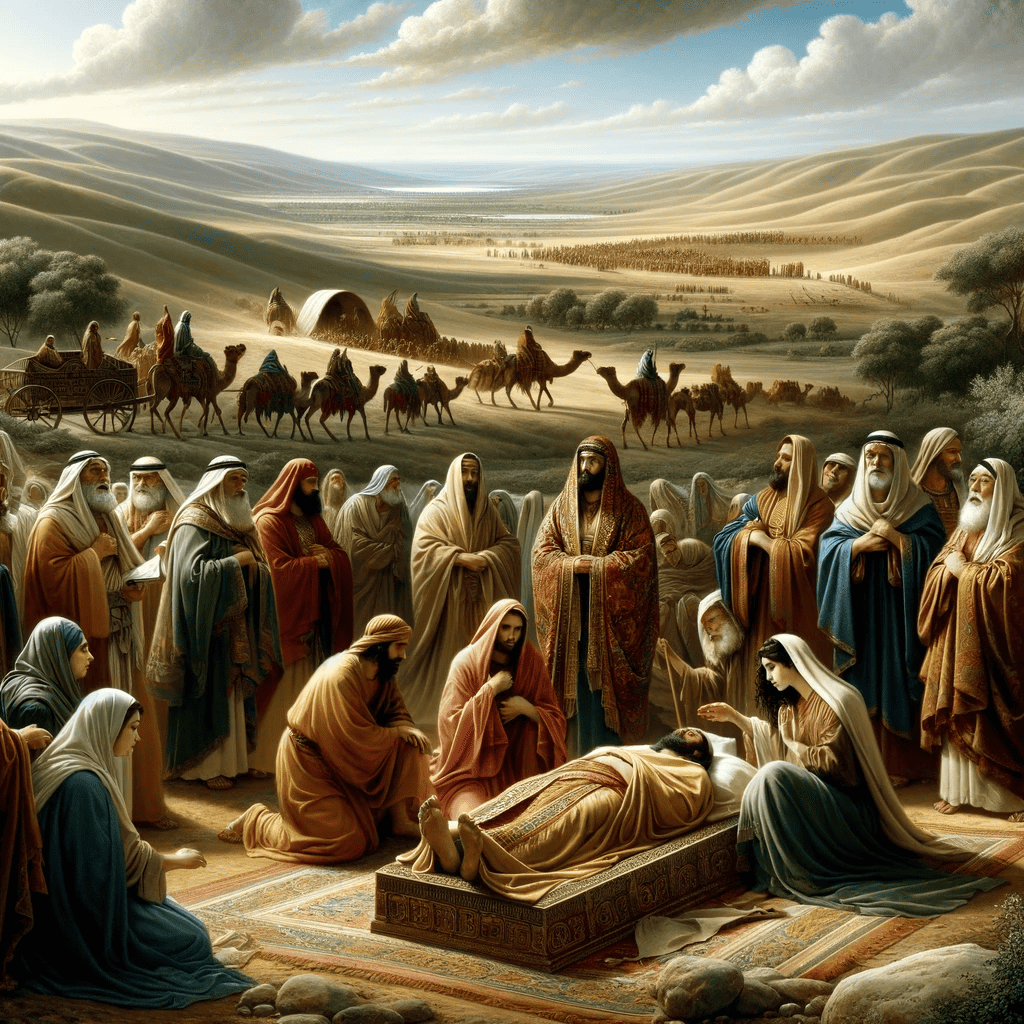
The story of the burial of Jacob in Canaan, as narrated in Genesis 49:28-50:14, unfolds in the aftermath of Jacob’s final blessings to his sons, where he bestows upon them prophetic words that sketch the destinies of the twelve tribes of Israel. As Jacob concludes his blessings, he charges his sons with a solemn request, expressing his desire not to be buried in Egypt but to rest with his ancestors in the cave in the field of Ephron the Hittite, the burial place of Abraham, Sarah, Isaac, Rebekah, and Leah.
After Jacob’s death, Joseph, deeply moved by the loss of his father, embarks on a journey of mourning and fulfillment of Jacob’s last wish. Joseph approaches Pharaoh to seek permission to carry Jacob’s body to Canaan for burial, as promised. Pharaoh, respecting Joseph’s grief and his father’s wish, grants him leave to undertake the journey.
The procession to Canaan is marked by grandeur and solemnity, a testament to the respect and honor Joseph held in Egypt and the significance of Jacob as a patriarch. Accompanied by both Egyptian officials and Jacob’s family, the caravan is a fusion of Egyptian and Hebrew mourning traditions. Upon reaching the threshing floor of Atad near the Jordan River, the intensity of their mourning catches the attention of the local inhabitants, who name the place Abel Mizraim, noting the profound grief of the Egyptians.
The burial itself is a poignant moment, fulfilling Jacob’s desire to be laid to rest with his forebears in the cave of Machpelah. This act not only honors Jacob’s last wishes but also symbolizes the deep connection between the Israelites and the Promised Land, even as they reside in Egypt. It serves as a powerful reminder of God’s promises to Abraham, Isaac, and Jacob regarding the land and the future of their descendants.
After the burial, Joseph and his brothers return to Egypt. However, the brothers, fearing Joseph’s retaliation now that their father is gone, send a message to Joseph, expressing their willingness to be his slaves. This reveals their ongoing guilt and fear over their past actions against Joseph. Joseph reassures them, comforting them with words of peace and affirming that he harbors no ill will. He recognizes God’s hand in the events that led him to Egypt, understanding them as part of a divine plan to save lives.
As the story unfolds, Joseph’s reassurance to his brothers after the burial of Jacob is a pivotal moment that underscores the transformative power of forgiveness and reconciliation within the family. Despite the brothers’ fears and past wrongdoings, Joseph’s response reveals a profound understanding of God’s sovereignty and a commitment to mercy over vengeance. This act of forgiveness not only heals familial rifts but also reaffirms the unity and destiny of the Israelite people under God’s providential plan.
Joseph’s insight into the events of his life—recognizing that what his brothers intended for harm, God meant for good to accomplish the saving of many lives—offers a powerful theological reflection on the nature of God’s providence and the ability of faith to transcend personal and communal adversity. It is a testimony to Joseph’s character and his deep faith in God’s purposes, even in the face of betrayal and suffering.
The narrative also highlights the themes of legacy and covenant. The burial of Jacob in Canaan, alongside his ancestors, symbolizes the enduring connection of the Israelites to the Promised Land and to the promises made by God to Abraham, Isaac, and Jacob. This act of returning Jacob to his ancestral home serves as a tangible reaffirmation of the covenant between God and His people, a covenant that promises land, blessing, and a great nation.
Moreover, the journey back to Canaan for Jacob’s burial and the subsequent return to Egypt encapsulate the Israelites’ complex identity as a people destined for the Promised Land yet temporarily residing in a foreign country. This duality foreshadows the eventual exodus of the Israelites from Egypt and their journey toward the fulfillment of God’s promises.
In the broader narrative of the Bible, the story of Jacob’s burial, and the events that follow, serve as a bridge between the patriarchal era and the forthcoming story of the Exodus. It reinforces themes of faith, redemption, and the unfolding of God’s plan for His people. The familial bonds, tested and restored, anticipate the challenges and triumphs the Israelites will face as a community bound by faith in God’s promises.
Thus, the burial of Jacob in Canaan, as recorded in Genesis, is more than a historical or familial event; it is a profound statement of faith, identity, and divine purpose. It reminds us of the importance of remembering and honoring our past, living with integrity and forgiveness in the present, and maintaining hope and faith in God’s promises for the future.